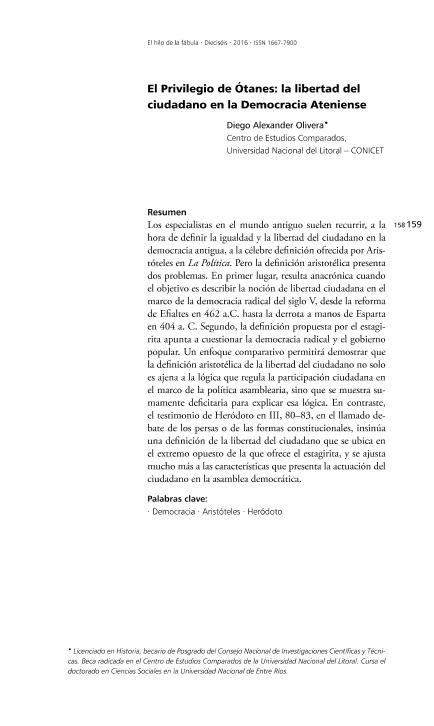Mostrar el registro sencillo del ítem
dc.contributor.author
Olivera, Diego Alexander

dc.date.available
2019-02-20T14:14:46Z
dc.date.issued
2017-02
dc.identifier.citation
Olivera, Diego Alexander; El Privilegio de Ótanes: La libertad del ciudadano en la Democracia Ateniense; Universidad Nacional del Litoral; El Hilo de la Fabula; 16; 2-2017; 159-172
dc.identifier.issn
2362-5651
dc.identifier.uri
http://hdl.handle.net/11336/70511
dc.description.abstract
Los especialistas en el mundo antiguo suelen recurrir, a la hora de definir la igualdad y la libertad del ciudadano en la democracia antigua, a la célebre definición ofrecida por Aristóteles en La Política. Pero la definición aristotélica presenta dos problemas. En primer lugar, resulta anacrónica cuando el objetivo es describir la noción de libertad ciudadana en el marco de la democracia radical del siglo V, desde la reforma de Efialtes en 462 a.C. hasta la derrota a manos de Esparta en 404 a. C. Segundo, la definición propuesta por el estagirita apunta a cuestionar la democracia radical y el gobierno popular. Un enfoque comparativo permitirá demostrar que la definición aristotélica de la libertad del ciudadano no solo es ajena a la lógica que regula la participación ciudadana en el marco de la política asamblearia, sino que se muestra sumamente deficitaria para explicar esa lógica. En contraste, el testimonio de Heródoto en III, 80–83, en el llamado debate de los persas o de las formas constitucionales, insinúa una definición de la libertad del ciudadano que se ubica en el extremo opuesto de la que ofrece el estagirita, y se ajusta mucho más a las características que presenta la actuación del ciudadano en la asamblea democrática.
dc.description.abstract
When defining the equality and freedom of citizens in Ancient Times’ democracy, scholars tend to resort to the famous definition coined by Aristotle in Politics. However, this definition presents two problems. First, it is anachronistic when the aim is to describe the notion of citizen freedom in the context of radical democracy of the 5th Century B.C. from Ephialtes’ reform in 462 B.C. until the defeat of Sparta in 404 B.C. Second, the definition penned by the Greek philosopher is aimed at bringing into question radical democracy and popular government. A comparative approach will allow us to demonstrate that Aristotle’s definition of citizen freedom not only is alien to the rationale that regulates citizen participation in the framework of the assembly’s policy, but also that it is incapable of explaining such rationale. By contrast, Herodotus’ testimony in III, 80–83 regarding the so called debate of the Persians or on the constitutional forms foreshadows a definition of citizen freedom which stands at the opposite end of the one offered by the Greek philosopher and is more attuned to the traits of the way in which citizens act in the democratic assembly.
dc.format
application/pdf
dc.language.iso
spa
dc.publisher
Universidad Nacional del Litoral
dc.rights
info:eu-repo/semantics/openAccess
dc.rights.uri
https://creativecommons.org/licenses/by-nc-sa/2.5/ar/
dc.subject
Aristóteles
dc.subject
Democracia
dc.subject
Heródoto
dc.subject.classification
Ciencia Política

dc.subject.classification
Ciencia Política

dc.subject.classification
CIENCIAS SOCIALES

dc.title
El Privilegio de Ótanes: La libertad del ciudadano en la Democracia Ateniense
dc.type
info:eu-repo/semantics/article
dc.type
info:ar-repo/semantics/artículo
dc.type
info:eu-repo/semantics/publishedVersion
dc.date.updated
2019-02-12T14:29:31Z
dc.journal.number
16
dc.journal.pagination
159-172
dc.journal.pais
Argentina

dc.journal.ciudad
Santa Fe
dc.description.fil
Fil: Olivera, Diego Alexander. Consejo Nacional de Investigaciones Científicas y Técnicas. Centro Científico Tecnológico Conicet - Santa Fe; Argentina. Universidad Nacional del Litoral. Facultad de Humanidades y Ciencias. Centro de Estudios Comparados; Argentina
dc.journal.title
El Hilo de la Fabula
dc.relation.alternativeid
info:eu-repo/semantics/altIdentifier/url/https://bibliotecavirtual.unl.edu.ar/publicaciones/index.php/HilodelaFabula/article/view/6289
dc.relation.alternativeid
info:eu-repo/semantics/altIdentifier/doi/https://doi.org/10.14409/hf.v0i16.6289
Archivos asociados
